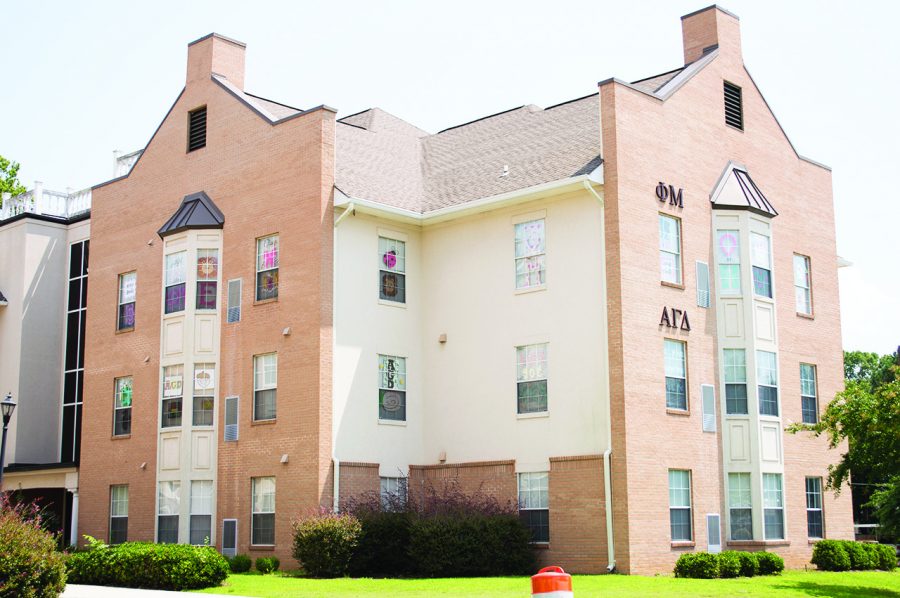No UNA sorority houses exist due to expenses and lack of expressed interest
October 3, 2013
Looking around campus, it is noticeable that sororities reside in Appleby dorms while fraternities have houses off-campus. There are several rumors regarding why sororities lack houses, but the reason boils down to convenience.
The difference between fraternity and sorority housing depends primarily on the events revolving around the specific chapters, said Director of Student Engagement Tammy Jacques.
“It’s a lot of work to maintain a house,” Jacques said. “It’s a lot of money. It can be a big headache to have your own house. Even our fraternities struggle with that. Fraternities really focus a lot on their houses and they have a lot of events and functions (in their houses). For sororities, it’s not as big of a deal here. They have chapter rooms. They have facilities on campus that are maintained by the university and it’s not as much upkeep for them. There is sorority housing at bigger schools, but our chapters just haven’t expressed any interest.”
One primary difference between fraternity and sorority housing is the amount of members in a given chapter, said Julie Fletcher, director of Greek Affairs.
“The sororities total chapter member is 90 — some of them are a little bit above that,” Fletcher said. “That house has to be able, on an average basis, to fit a living room size of 106 if you have meetings. If not, you’re also tacking on the house and another meeting facility, and that’s just another responsibility. The fraternities are significantly smaller in size.”
If a sorority desired to move into a house, they may struggle with locating a specific house to move into.
Fraternities Alpha Tau Omega and Delta Chi are the only fraternities that rent university-owned houses on university-owned land, Jacques said. Sigma Chi, Pi Kappa Alpha, Phi Gamma Delta and Kappa Sigma own their houses and either own or rent the land.
“In the last year, we’ve been told that there will not be any more house rentals from the university going to any Greek organizations or any student organizations, and that’s because the houses are built as family-style homes and they can’t sustain the large population that comes into them,” Jacques said. “The traffic is high. They have events at their houses that sometimes have hundreds of people in them and they can’t physically sustain that traffic.”
The chapter rooms are a positive aspect of living in a dorm, said Paige Drouillard, a member of Phi Mu sorority.
“When we have chapter meetings, we could all access the room and not worry about disturbing other residents,” Drouillard said.
While there might be a misconception about the order in which sorority chapters at UNA are allowed to purchase a house, it is up to the individual sorority whether they want to buy, rent or build a house off-campus and Student Engagement would not prevent any chapter from doing so, Jacques said.
“There’s nothing stopping chapters from building houses here as far as the university is concerned,” Jacques said. “None of the chapters have expressed interest in building houses. The statement (that one particular sorority has to be first) is inaccurate information. If one of our chapters was at membership and had large numbers and they’ve had the money and they’re ready to build, there’s not anything that’s necessarily stopping them from building.”
The biggest thing that is keeping sororities from looking into houses most likely involves competition, Fletcher said.
“In the mind of sororities on the national level they want to stay competitive,” Fletcher said. “By the four sororities here having the space in Appleby, it puts them on an even playing field so they’re all able to recruit in their houses. They’re all able to have the same amount of rooms in their dorms. They’re all able to have the same amount of space. When you do get into houses, you get into competition of things like size and what things look like and being closer or (further away). It just opens a larger can of worms than maybe a national organization doesn’t want to deal with.”
If a sorority would be interested in moving into a house, they would first contact their national organizations, Jacques said.
Ultimately, housing should be seen as not merely an opportunity for sororities, but a hefty expense, Fletcher said.
“Housing is expensive,” Fletcher said. “It’s expensive on the member and it’s also expensive (from) the national/international headquarters standpoint. You have to have an abundance of insurance policies, fire codes, handicap codes and, I mean, you have to make sure all of that is good to go. But it also has that rent that’s due each month just like if a chapter member is staying in a dorm hall. You might not have the amenities that a campus would also provide if you weren’t paying some of those housing fees and all of that has to be looked into.”












